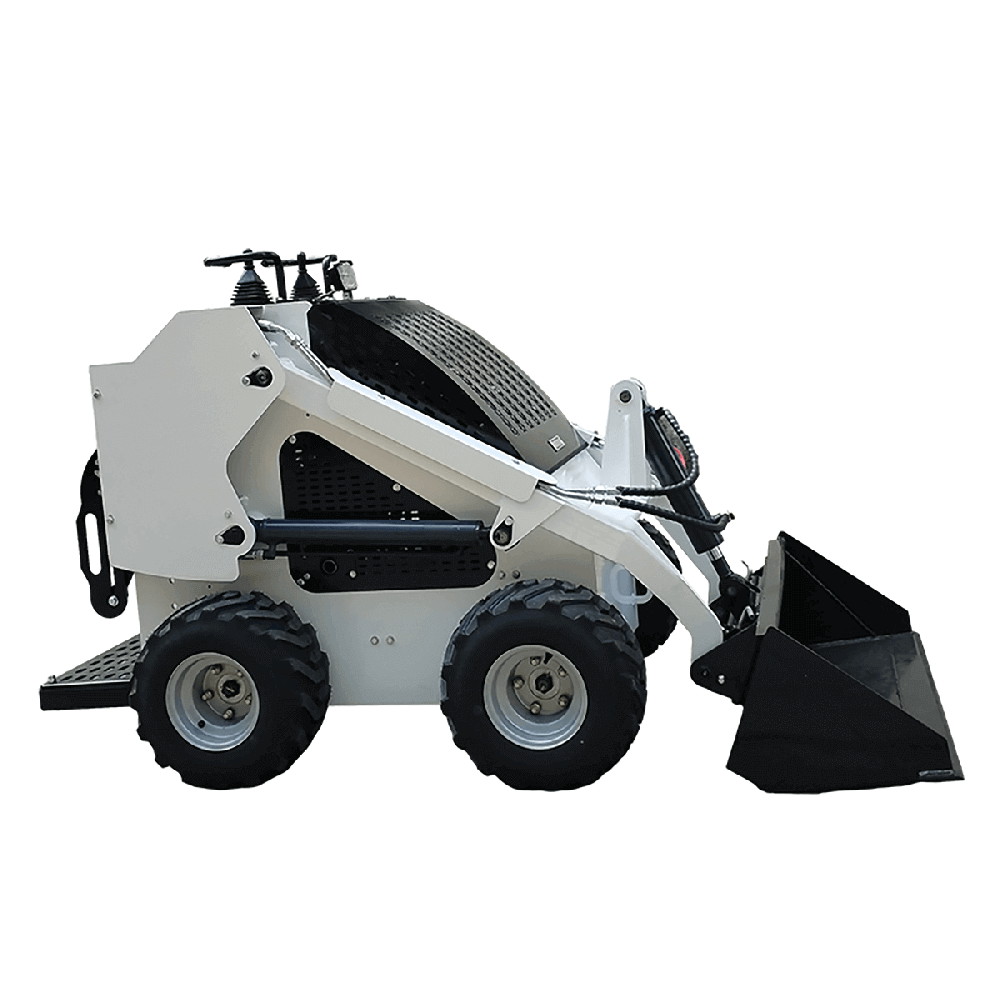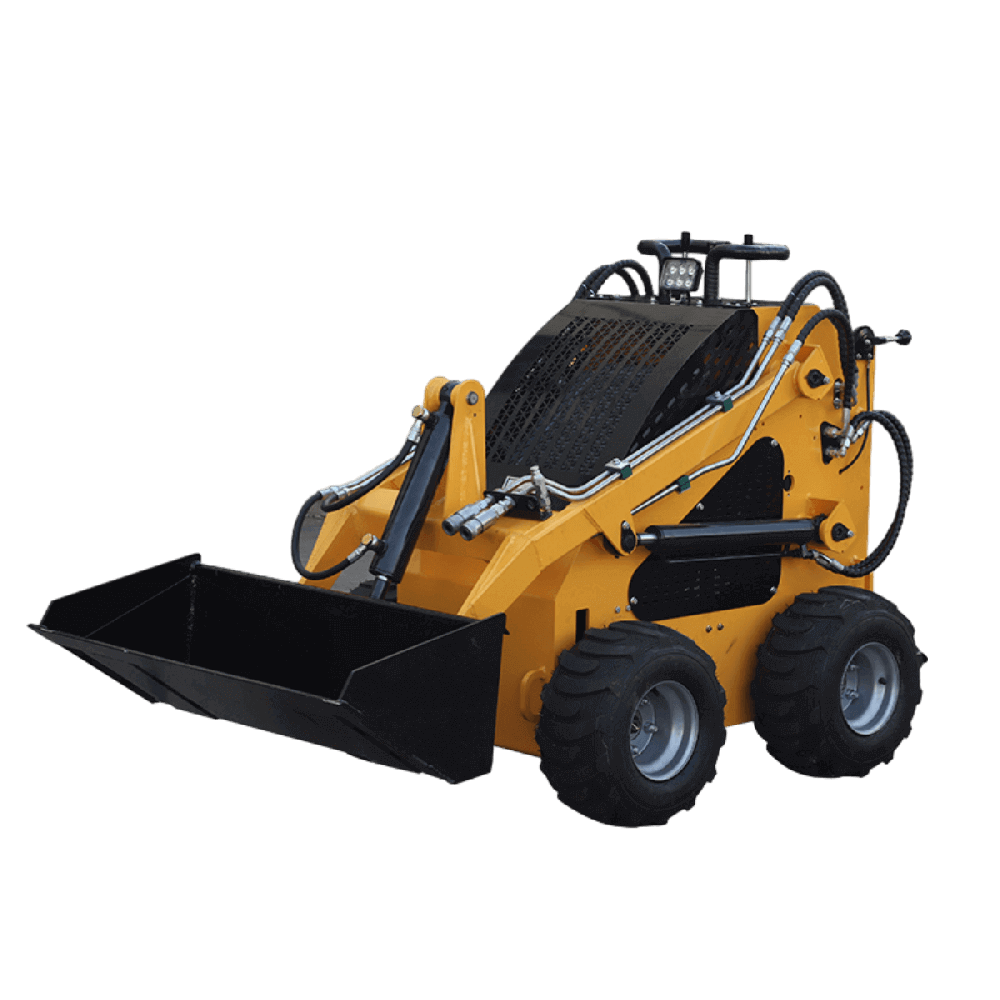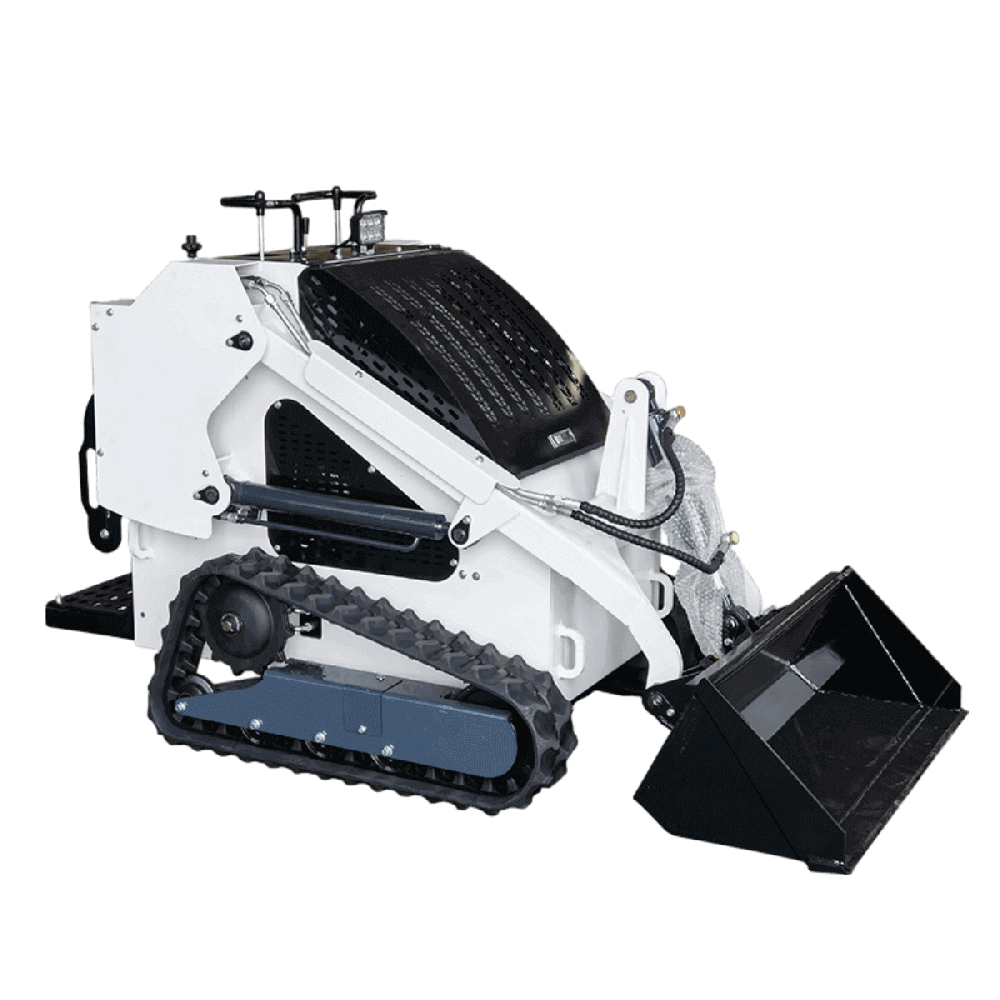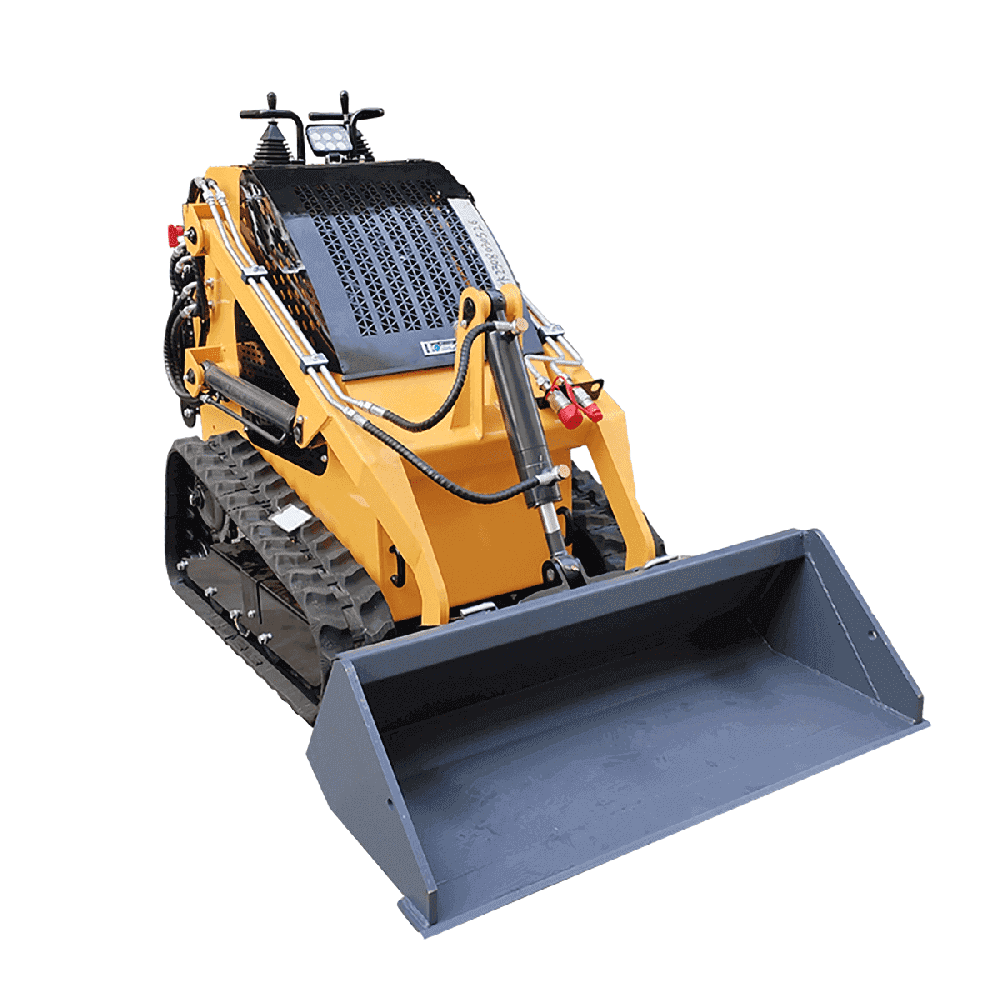skid steer loader vs. compact track loader (CTL)
November 28, 2024
Choosing the right equipment is essential to improving efficiency and productivity. Two popular types of machinery that are often considered are skid steer loaders and compact track loaders (CTL).
Skid steer loaders and compact track loaders may look similar on the outside, but they are very different tools when it comes to their capabilities.
Skid steer loader or compact track loader? BISON will take an in-depth look at these machines, explaining what each is and highlighting their pros and cons. We’ll cover the key differences between them to help you make a choice based on your specific needs.
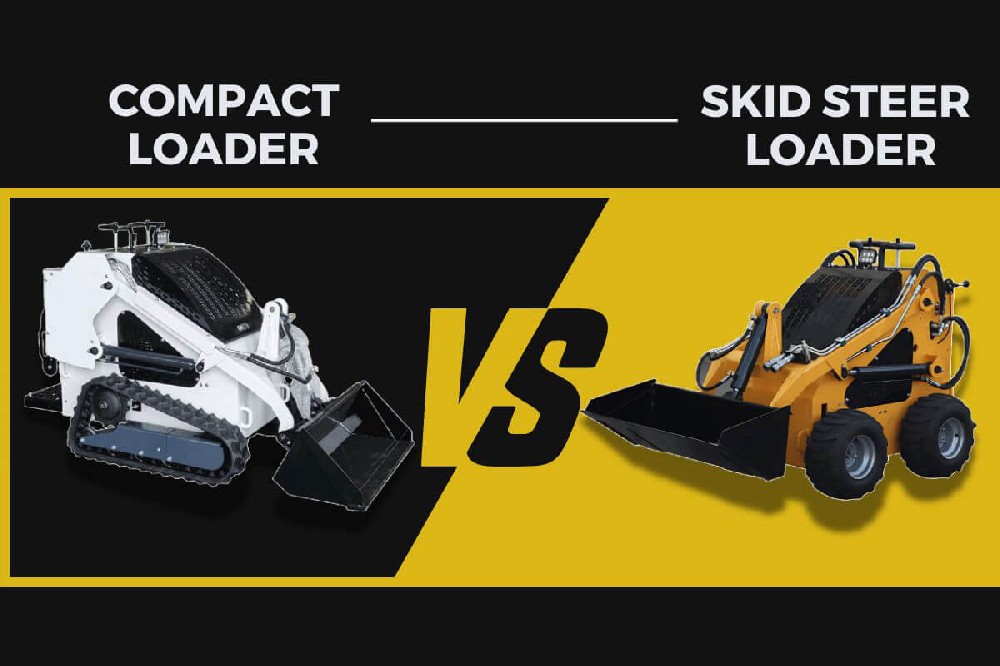
What is a skid steer loader?
A skid steer loader, sometimes called a wheel loader or skid steer, is a versatile, compact machine that can be equipped with a lift arm and a variety of attachments. A skid steer loader has four wheels and a unique drive mechanism. The front and rear axles automatically adjust to synchronize their movement with each other, but there is no separate steering mechanism. To turn a skid steer loader, you simply increase the speed of one wheel on one side. As the machine turns, it drags, or slides, its wheels along the ground. This makes them highly maneuverable and ideal for tight spaces.
Advantages of a skid steer loader
Versatility: With a wide variety of attachments, a skid steer loader can handle a variety of tasks that would otherwise require multiple machines. From jobsite clearing to terrain preparation, it can perform any construction and landscaping task.
Weight: Skid steers are lightweight and don't require a towing device, making them easy to maneuver and transport.
Better maneuverability on hard surfaces: They can travel quickly over asphalt, cement, concrete, and compacted dirt. Additionally, they have higher ground clearance and can better negotiate obstacles.
Cost: The initial purchase price is lower compared to CTLs, and wheels are also generally less expensive to maintain than tracks, making them an affordable option for many businesses.
Disadvantages of skid-steer loaders
The weight of a skid-steer loader is distributed over the tires. This can affect its balance and sturdiness in wet and muddy terrain. It is at risk of sinking and getting stuck in mud. On slopes and in wet conditions, the tires may slip. On rough terrain, the tires are more susceptible to damage.
What is a compact track loader?
Compact track loaders are like skid steers and can do the same job, but have a very different chassis. CTLs use two parallel tracks instead of wheels. This key difference enhances their traction and stability, especially on uneven or soft terrain like mud, sand, or snow.
Advantages of compact track loaders
Greater lifting capacity: CTL tracks put less pressure on the ground than wheels, allowing them to handle heavier loads. This makes them suitable for working on delicate surfaces like grass or snow without causing excessive damage.
Weight distribution: Compact track loaders have better weight distribution due to their two tracks. This feature, along with the fact that they transfer less weight to the ground, makes them ideal for soft, uneven, or challenging terrain. They can even be used to traverse loose sand and loose gravel.
Slope handling: Compact track loaders can climb slopes seamlessly due to the extra ground contact and the machine's low center of gravity.
Smooth ride: Compact track loader tracks make for a smoother, more comfortable ride than wheeled vehicles.
Disadvantages of compact track loaders
Turning: Compact track loaders turn less efficiently and are not as maneuverable as skid steers. The best way to turn this machine is to do a three-point turn, which minimizes track wear.
Cost: The initial purchase price is higher, plus compact track loaders require a lot of maintenance. Replacing tracks is costly and takes longer than replacing tires.
Ground clearance is low, and it can be difficult to get over large obstacles.
Compact track loader vs. skid steer loader comparison
Now that you know the pros and cons of each machine, you can more easily compare them and make your choice. Here is a skid steer loader vs. compact track loader comparison:
Work environment
Consider the terrain of your job site. A skid steer loader is the best choice for working on hard, flat surfaces such as asphalt, concrete, roads, and other developed surfaces. The wheels are designed to perform best on these surfaces without damaging the tires or the surface.
For more difficult and challenging terrain such as undeveloped land and rough terrain, or adverse conditions such as wet, snowy, or muddy conditions, a compact track loader is the best choice. Its tracks distribute its weight more evenly, which reduces ground pressure and minimizes damage to the ground. , making it an ideal choice for sensitive or soft surfaces.
Maneuverability
A skid steer loader uses a simple but powerful mechanism. They use hydraulic controls to drive each wheel independently, allowing for tight turns and quick changes of direction. The turning radius is very tight, and they almost roll in place, making them ideal for maneuvering in tight spaces.
Track loaders are less likely to do this in tight spaces. They are controlled with a similar hydraulic system, but use tracks driven by sprockets to move. This allows for smoother operation on uneven ground. The slightly larger turning radius makes it difficult to make tight turns quickly and easily.
If your job site has tight space and many obstacles, a small skid steer may be the best choice. However, if the job site has wide space and requires greater maneuvering or lifting capacity, a large skid steer may be more suitable.
Performance
A skid steer loader is a high-speed machine. It is lighter, has a higher center of gravity, and tires allow it to move faster than the tracks of a compact track loader. But it has less traction, which may limit push/pull power on slippery ground. It generally has lower lifting capacity than a small track loader.
Track loaders are slower on hard surfaces, but they are faster and more efficient than skid steers on rough, muddy terrain. The weight distribution on a track loader increases the area it contacts the ground. Superior traction provides better push/pull power and the ability to move heavy objects without slipping, especially on slopes or soft soils. In addition, they typically have higher lift capacities to effectively handle heavier loads.
Cost considerations
Cost is a key factor. When considering cost, evaluate the initial investment and weigh it against long-term maintenance, operating expenses, and the specific requirements of your work environment. This will help ensure the most cost-effective choice for your needs.
If you want a machine that is simple to maintain and inexpensive, you should purchase a skid steer loader. They require less frequent maintenance and are easier to replace if parts break. The wheels give you easy access to the chassis, making it easy to clean and maintain the machine. In addition, they tend to be more fuel-efficient on hard surfaces due to their lighter structure and less rolling resistance.
Small track loaders typically have a higher initial cost due to the complexity of the track system and overall design. Tracks cover almost the entire chassis, which means more time and effort is spent on cleaning and maintenance. Track replacement is also a significant cost factor, especially when used frequently on challenging terrain, which can accelerate track wear. Finally, due to the increased power required for traction and stability, more fuel may be consumed in harsh conditions.
Project requirements
When determining the right machine for your project, start by evaluating the specific task at hand. Here are some common applications:
Construction: Skid steer loaders are often found on urban construction sites where space is limited. They are used for tasks such as demolition, material transportation, and site clearing. Compact track loaders excel on larger or rougher construction sites, especially where ground conditions are challenging.
Landscaping: Both machines are popular in landscaping due to their ability to handle a variety of attachments. Skid steers are the top choice for projects that require precise movement. Compact track loaders are ideal for creating smooth surfaces on soft ground or handling large-scale landscaping remodeling.
Agriculture and forestry: Skid steers can effectively manage forage and clearing tasks. Compact track loaders are better suited for forestry work, providing stability on uneven forest floors.
comparison table for skid steer loaders and compact track loaders
| Categories | Skid steer loaders | Compact track loaders |
|---|---|---|
| Work environment | Best suited for hard, flat surfaces (asphalt, concrete). | Excellent for rough, undeveloped, or soft terrain. |
| Maneuverability | Excellent in tight spaces with very tight turning radius. | Smoothly handles uneven ground but with a wide turning radius. |
| Performance | Faster on hard surfaces, lighter weight, lower traction and lift capacity. | Better traction and higher lift in soft or sloping conditions. |
| Cost | Lower initial and maintenance costs, more fuel efficient on hard surfaces. | Higher initial cost, more maintenance, higher fuel consumption in tough conditions. |
| Best for Projects | Urban construction, precision landscaping, agricultural tasks. | Large or rough construction sites, extensive landscaping, forestry work. |
Conclusion
It is more beneficial to determine which machine best suits your needs than to ponder whether a compact track loader vs. skid steer loader is better. Ultimately, it depends on what your team and company need. For urban construction sites and projects with solid ground, skid steer loaders are the ideal choice. Meanwhile, compact track loaders shine in challenging terrain and unpredictable weather conditions.
As a professional loader manufacturer in China, BISON invites you to explore our comprehensive loader series that are designed to meet the various needs of modern construction and related fields. Please contact us and let us help you find the perfect machine for your project.
